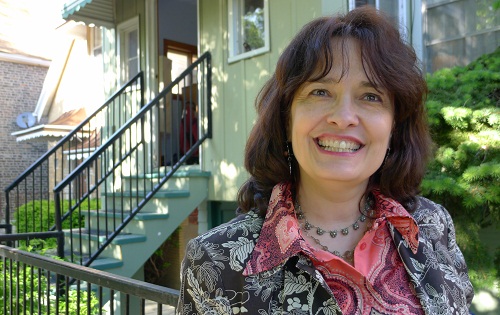For NATO protesters, a welcome mat
By Chip Mitchell

For NATO protesters, a welcome mat
By Chip Mitchell
With Chicago’s NATO summit just days away, officials are battening down the hatches for protests that could draw thousands from out of town. But some other Chicagoans are rolling out a welcome mat for those same protesters. They’re clearing space in their businesses and churches, allowing tents in their yards, even opening spare bedrooms. We report from our West Side bureau.
Officials are planning to close streets and highways. They’re bringing in state police officers and National Guardsmen and preparing for mass arrests. They’re ready to roll out a military device that sends ear-piercing tones over long distances. But over in Chicago’s McKinley Park neighborhood, there is Lorraine Chavez.
CHAVEZ: And here is another bedroom if someone has an inflatable mattress. My kids are off to college so I have some empty space.
Chavez is offering two rooms of her cramped century-old house to some protesters from Florida this weekend.
MITCHELL: What do you know about these guests?
CHAVEZ: Not much [laughs] but I requested older guests.
Chavez says she is taking them in because the protest could bring some attention to joblessness in this country.
CHAVEZ: I am underemployed myself, despite having a master’s, a career path, and doctoral work at the University of Chicago. All of the men in my family who are responsible for college-age kids have all been laid off. If we did not have wars, we could have investments for jobs. This is the moment that these demands are being made and heard and I need to be a part of it.
Chavez got connected to the Floridians through Occupy Chicago. That group is using its website to collect lodging offers and requests for the NATO protests. A group called CANG8 has a similar site.
HUNT: If somebody has 20 dogs and someone’s allergic to dogs, that would be a bad match.
Pat Hunt’s helping run that system.
HUNT: If they’re providing a warehouse space for 50 to 100 people, they’ve asked us to have somebody there just to make sure that [there will be] no drugs, no alcohol, no weapons — basically that type of thing.
The anti-NATO groups say they have fielded offers from about 265 potential hosts. They include a homeowner who is installing a wheelchair ramp for a disabled protester. A Latino nonprofit group is taking in guests as long as they don’t draw police back to the neighborhood, which is full of undocumented immigrants. A man in DuPage County is letting protesters camp around a house he is losing to foreclosure. An African-American congregation is offering its yard for tents.
MARSHALL: It was almost a no-brainer for us. It was just a matter of, really, logistics and trying to work out the logistics for it.
John Marshall serves on the board of that church, Trinity Episcopal. It’s just a few blocks from McCormick Place, the site of the NATO summit. He says hosting protesters is not exactly a stand against the military alliance.
MARSHALL: It’s the residue of what happens with war, what happens to refugees, what happens to people who are made poor because of war. Even if they’re not within the theater of war, there are lots of people who are poor in the world that we could be helping as opposed to making another B-1 bomber.
Trinity officials say there hasn’t been much fallout for taking that stand but they are hearing from some neighbors. When the church held an educational forum about NATO, some nearby homeowners showed up with questions about the campers.
NEIGHBOR: How are you going to keep your guests on your property and not coming onto the property of other people who live in the neighborhood?
MARSHALL: We’re going to monitor them. And they’re going to be outside at their own Porta-Potties and provide their own stuff.
Someone peeing in a neighbor’s yard isn’t the worst thing that could happen. Pat Hunt, the protester who is running one of the housing websites, says what worries her is theft or any sort of attack.
HUNT: Either one of the guests takes advantage of the host or a host takes advantage of one of the guests. Somebody would get hurt. That’s always my fear.
Hunt says these logistical considerations go beyond this protest against NATO. She says her movement has to start creating the sort of world it’s demanding.
HUNT: If what we’re saying is shared resources then we have to model shared resources.
Hunt thinks this model can work. And, this weekend, we might see if she’s right.